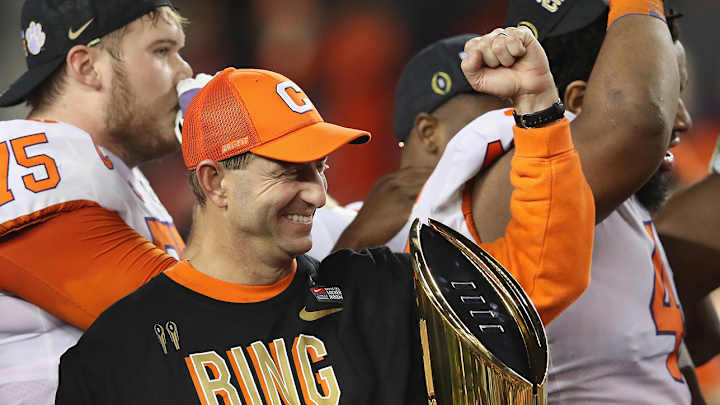Why Dabo Swinney’s Success Story Sounds a Whole Lot Like Facebook’s

Welcome back to SCREENSHOTS, a weekly report from the intersection of sports, media, and the Internet.
Clemson coach Dabo Swinney set down a Diet Coke that was undoubtedly half full and prepared his monologue. Answering Monday night’s final question after his Tigers silenced every doubter during a 44-16 toppling of Alabama, Swinney opted not to recap his team’s dominant evening nor sum up the first 15-0 year in FBS history. Instead, he leapt back a decade. Wearing an oversized championship costume pocked with official Nike stickers, in front of a background decorated with @CFBPlayoff #NationalChampionship and the event’s oblong logo, Swinney shared his own brand’s founding myth.
“I've said this many times,” Swinney warned local reporters before recounting his first meeting with Clemon’s board of trustees. “One of the guys says, ‘You know, Coach, we just want to be a program like Michigan and Florida and Georgia,’” Swinney said. “And I’m sitting there talking to myself, saying, ‘Keep your mouth shut.’” But, as he put it, “the Alabama in me wouldn’t allow that. So I kind of cut the guy off, and I just said, you know, I don't mean this disrespectfully, but that's not my goal. My vision for Clemson is for all these other schools to want to be like Clemson. I want to build a model program.” That was 10 years ago this season.
Swinney doesn’t relate to founder culture. He hasn’t gobbled up Steve Jobs biographies. "I've never seen myself as a Silicon Valley guy or anything like that," he told David Hale in 2017. As he lifted a second national title in three years, however, less than 10 miles from Apple Park and the Googleplex, the similarities were impossible to ignore.
In 17 days, Clemson opens its new $55 million football facility with a 24-seat theatre, a nap room & slide that goes from meeting rooms pic.twitter.com/AMABPgYgvb
— Darren Rovell (@darrenrovell) January 10, 2017
For one, there’s the slide—plucked from a version at Google HQ like an NFL coach stealing Philly Special—and standing in for a certain lifestyle. "We're going to have fun,” Swinney often says. When one Tiger spent a couple weeks at a Silicon Valley internship, he came back saying, "The culture was the same.” Those vibes draw talent, but something else inspires the fervent loyalty that gets first-round picks to return to school and sought-after assistant coaches to stick around: a mission.
Facebookers believe they’re creating a better world by connecting people. Googlers see the good in organizing and offering human knowledge. Becoming the country’s fourth and sixth most valuable companies was just a side effect of that pursuit, crusaders suggest. The same goes for Clemson, as Dabo explained in another section of his four-minute closing address.
“How do all of these players … turn out in life?” Swinney said. “That's really what I'm going to be measured by. If we can win some National Championships along the way, then that's a blessing. But that's not our goal. Our goal is to have a program of consistency and a program that graduates its players and to do it in a way that loves them and equips them with the tools that they're going to need to go out and dominate outside the lines, not just inside the lines.”
For Clemson’s clearest embrace of tech thinking, head to Twitter. The school upped its creative content payroll this decade and quickly became the most followed account in the sport, recognizing that the staff needed to speak recruits’ language.
More significant than those similarities, though, is that fact that Swinney, despite all of them, doesn’t see himself as building a startup football program. How could that be!? Maybe because he’s far from alone.
While Clemson’s rise might be unprecedented, its current dominance isn’t unique. At the FCS level, North Dakota State fivepeated in 2016. While the chaos of March Madness has produced four winners over the last five seasons, Duke and Kentucky have owned the top two spots in recruiting each season, whereas the previous five years saw six teams in those spots. Six out of nine years this decade, Ken Pomeroy’s top-rated team has finished better than the previous season’s No. 1 squad. Two out of the six longest conference championship streaks are still active. In the women’s game, UConn just set the consecutive wins record. And, of course, Alabama isn’t going anywhere. Nick Saban collected 40% more four and five-star recruits than any other college program this year.
Similar trends can be found in the pros, too. It’s not just the Warriors, who embraced their venture capital roots while setting the single season wins record. For the first time ever, three AL teams won 100 games this season, a year after analytics website FanGraphs asked “Is Baseball’s Age of Parity Over?” The WNBA’s Lynx reached an all-time record six WNBA Finals—in seven seasons. Even the NHL has seen the spread in its standings gradually increase since 2010, excluding the lockout shortened year. But we’ll stick to college for now, because the case is clearer and our time is short.
It’s impossible to look at sports’ dominant powers and not recognize a global trend. The biggest companies are getting bigger. America’s richest cities are getting richer. This is simply what competition looks like in the age of platforms.
Let’s drop back to survey the field.
In a pre-digital world, riches came by selling things. Fifty years ago, nine of the 10 biggest U.S. companies sold cars, oil, or steel. The other sold computers. Now, the money is made in the middle. Google connects you to websites. Facebook connects you with friends. Amazon brings together merchants and consumers. Uber tells drivers where they can find riders. Apple makes it easy for us all to get to Google, Facebook, Amazon, or Uber. In business speak, we’re talking about “platforms” (What’s that? Platforms!?), which “facilitate a relationship between 3rd-party suppliers and end users” in the words of Ben Thompson.
To start, consumers are drawn to an improved experience. Then, as the user base grows, the entire platform improves—Google’s data gets better, Facebook has more photos of friends to show you, etc. Ultimately, winner-take-all outcomes are likely (sorry, Ask Jeeves). Imagine a stampede. It might start slow, but eventually everyone is moving. What alternative is there?
The same process has upended sports. Knute Rockne’s Notre Dame and Darrell Royal’s Texas were called factories for a reason. They were the biggest, and they produced the best.
Now, to attract talent, colleges need to be more player-friendly. Quarterbacks are more like for-hire drivers than car parts. They can pick their platform. Digital media has freed them further. Players build relationships with would-be teammates online. They no longer needed to stay local for their families to watch every game. They can build international followings, regardless of where they go. Players are still amassing power, evidenced by the skyrocketing number of college transfers. Switching programs is now as uncontroversial as moving from Instagram to Snapchat.
(Free agency has wrought similar consequences in pro leagues, most notably the NBA. Meanwhile, if there’s a single reason why no NFL dynasty appears ready to take the Patriots’ torch, it might be the lack of power players currently wield.)
With those barriers gone, teams flattened from factories into platforms, connecting players with fans, with futures, and with each other. The same timeline has played out. Early adopters gravitated towards the best experience. A positive feedback loop developed. Winners began to take damned near all. Chasing growth in this environment, it was only natural for Clemson to grab the digital playbook, even unwittingly.
When Swinney took over, Clemson hadn’t won 10 games in 28 years. But the new coach had one advantage his better-off rivals lacked. A former Alabama wideout and later a receivers coach for over 10 years, he could speak to pass-catchers. In 2010, he got DeAndre Hopkins to pick Clemson over Michigan. In 2011, he nabbed Sammy Watkins from Florida. In 2016, Swinney got his first title with six pro pass-catchers headed to the NFL on the roster. Ta-dah, a minimum viable product: Receiver U. While Nick Saban pumps out defensive linemen and linebackers, Clemson had 10 wideouts in the pros this season.
One day, Justyn Ross will be next. The 19-year-old from Phenix City, Alabama, put up 301 yards and three touchdowns over two playoff games, leading everyone to wonder how Saban let him get away. “He wanted to be a part of our tradition that we have at the receiver position,” Swinney said Monday. And like any good platform, Clemson spun its dominance in that niche category into growth potential in another. Why did the Tigers land phenom QB Trevor Lawrence, besides the good culture, the strong mission, the slide? "Clemson always has great wide receivers and knows how to use their receivers really well," Lawrence said in 2017.
So, how did Clemson disrupt college football? The same way Twitter did. (The the lack of pay for the people actually producing the coveted content represents another similarity.). And now, the program is looking to become the Uber to Bama’s Lyft, or else enter into a Google–Facebook duopoly that shows no end in sight.
“Listen, if a guy like me,” Swinney said on the field postgame, before stopping himself—once again—to self-cite. “I said this two years ago. I mean, you can’t write a Hollywood script like this.”
Sure, but if he’d looked around, Swinney would have found a similar story in the halls of just about every office building between San Francisco and San Jose.
“We drove … out here to wherever-the-heck California we are, alright, to play a football game,” Swinney said at the time. So maybe he didn’t recognize Silicon Valley. Can you blame him? The whole planet is starting to work the same way.
SCREENSHOTS
• The Cowboys are still in the playoffs, and that’s great news for their very public fans.
• “Network TV can’t survive without the NFL,” Anthony Crupi writes.
• During their final NFL telecast of the season, ESPN accidentally played a song “widely associated with pro-Confederacy sentiment” before apologizing.
• During the College Football Playoff National Championship Game (can we please change that name?), ESPN gave a teaser for its upcoming 30for30 slate, including projects covering Michael Vick and Lance Armstrong.
• Long discussed, Barstool officially launched its $50/year premium tier this week. David “El Pres” Portnoy, in announcing the product, said the idea came from the company’s corporate investors at the Chernin Group and that he initially pushed back. On Twitter, Barstool CEO Erika Nardini wrote that Gold was created to allow the blog to preserve its ability to “be real.”
• D.C. United has signed an exclusive deal with streaming service FloSports, which will broadcast 21 of the club’s 34 matches.
• Amidst a flurry of CES announcements, Twitter said it will have a live show based around the upcoming Women’s World Cup.
• And just like that, Bruce Arians’s broadcasting career is back on hold. After a year calling games for CBS, he is now the coach of the Tampa Bay Buccaneers.
• There’s quite a swirl around what Andrew Wiggins did or didn’t say after a Timberwolves game Tuesday night. Regardless, it’s pretty clear multiple outlets reported he used a slur when talking about an opponent while the evidence remains much less conclusive.
THANK YOU, INTERNET…
...for 2019’s best feud yet.
I don’t care how many mistakes I’ve made in my 25 years in this business, I can assure you it falls short of the moribund product you guys contaminated the state of Arizona with over the previous 4 months...
— Stephen A Smith (@stephenasmith) January 10, 2019
